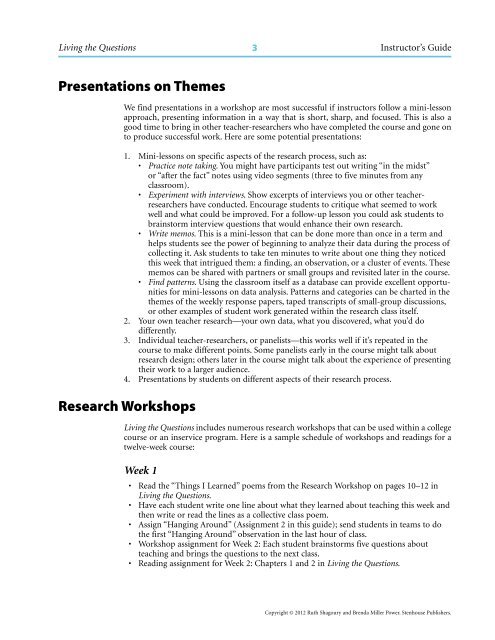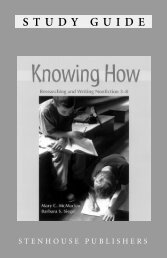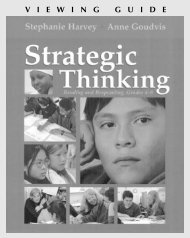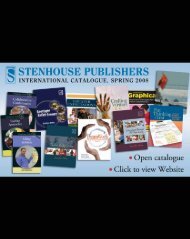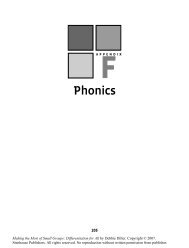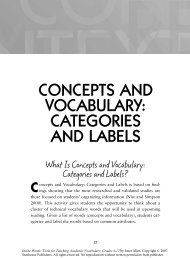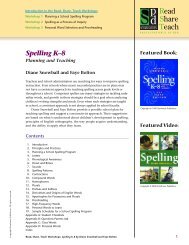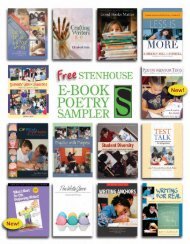Study Guide - Stenhouse Publishers
Study Guide - Stenhouse Publishers
Study Guide - Stenhouse Publishers
Create successful ePaper yourself
Turn your PDF publications into a flip-book with our unique Google optimized e-Paper software.
Living the Questions<br />
3<br />
Instructor’s <strong>Guide</strong><br />
Presentations on Themes<br />
We find presentations in a workshop are most successful if instructors follow a mini-lesson<br />
approach, presenting information in a way that is short, sharp, and focused. This is also a<br />
good time to bring in other teacher-researchers who have completed the course and gone on<br />
to produce successful work. Here are some potential presentations:<br />
1. Mini-lessons on specific aspects of the research process, such as:<br />
• Practice note taking. You might have participants test out writing “in the midst”<br />
or “after the fact” notes using video segments (three to five minutes from any<br />
classroom).<br />
• Experiment with interviews. Show excerpts of interviews you or other teacherresearchers<br />
have conducted. Encourage students to critique what seemed to work<br />
well and what could be improved. For a follow-up lesson you could ask students to<br />
brainstorm interview questions that would enhance their own research.<br />
• Write memos. This is a mini-lesson that can be done more than once in a term and<br />
helps students see the power of beginning to analyze their data during the process of<br />
collecting it. Ask students to take ten minutes to write about one thing they noticed<br />
this week that intrigued them: a finding, an observation, or a cluster of events. These<br />
memos can be shared with partners or small groups and revisited later in the course.<br />
• Find patterns. Using the classroom itself as a database can provide excellent opportunities<br />
for mini-lessons on data analysis. Patterns and categories can be charted in the<br />
themes of the weekly response papers, taped transcripts of small-group discussions,<br />
or other examples of student work generated within the research class itself.<br />
2. Your own teacher research—your own data, what you discovered, what you’d do<br />
differently.<br />
3. Individual teacher-researchers, or panelists—this works well if it’s repeated in the<br />
course to make different points. Some panelists early in the course might talk about<br />
research design; others later in the course might talk about the experience of presenting<br />
their work to a larger audience.<br />
4. Presentations by students on different aspects of their research process.<br />
Research Workshops<br />
Living the Questions includes numerous research workshops that can be used within a college<br />
course or an inservice program. Here is a sample schedule of workshops and readings for a<br />
twelve-week course:<br />
Week 1<br />
• Read the “Things I Learned” poems from the Research Workshop on pages 10–12 in<br />
Living the Questions.<br />
• Have each student write one line about what they learned about teaching this week and<br />
then write or read the lines as a collective class poem.<br />
• Assign “Hanging Around” (Assignment 2 in this guide); send students in teams to do<br />
the first “Hanging Around” observation in the last hour of class.<br />
• Workshop assignment for Week 2: Each student brainstorms five questions about<br />
teaching and brings the questions to the next class.<br />
• Reading assignment for Week 2: Chapters 1 and 2 in Living the Questions.<br />
Copyright © 2012 Ruth Shagoury and Brenda Miller Power. <strong>Stenhouse</strong> <strong>Publishers</strong>.


